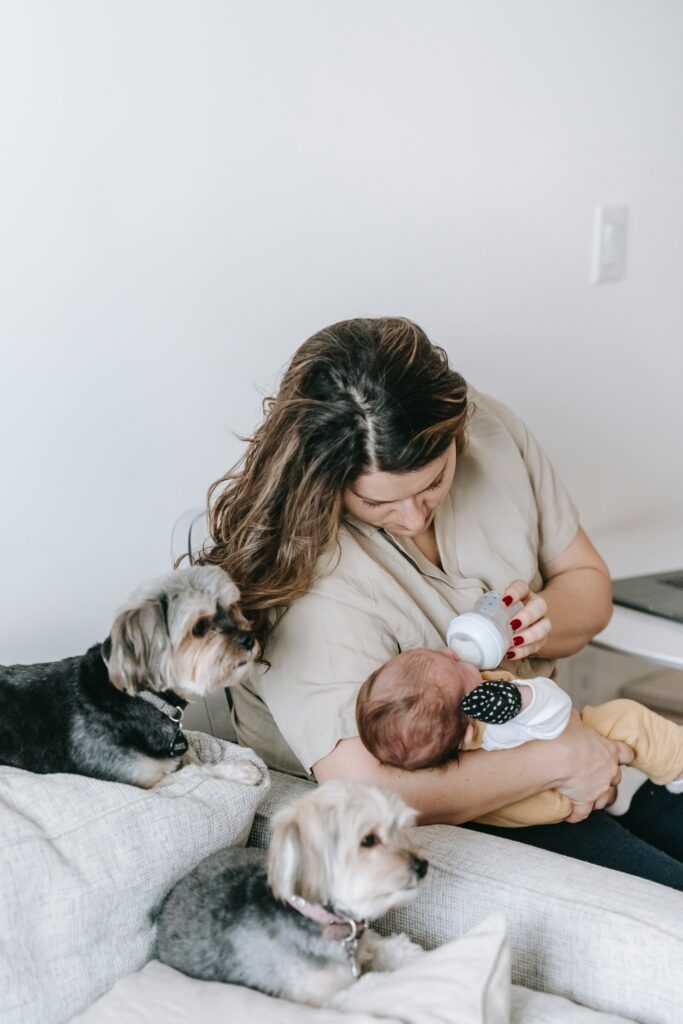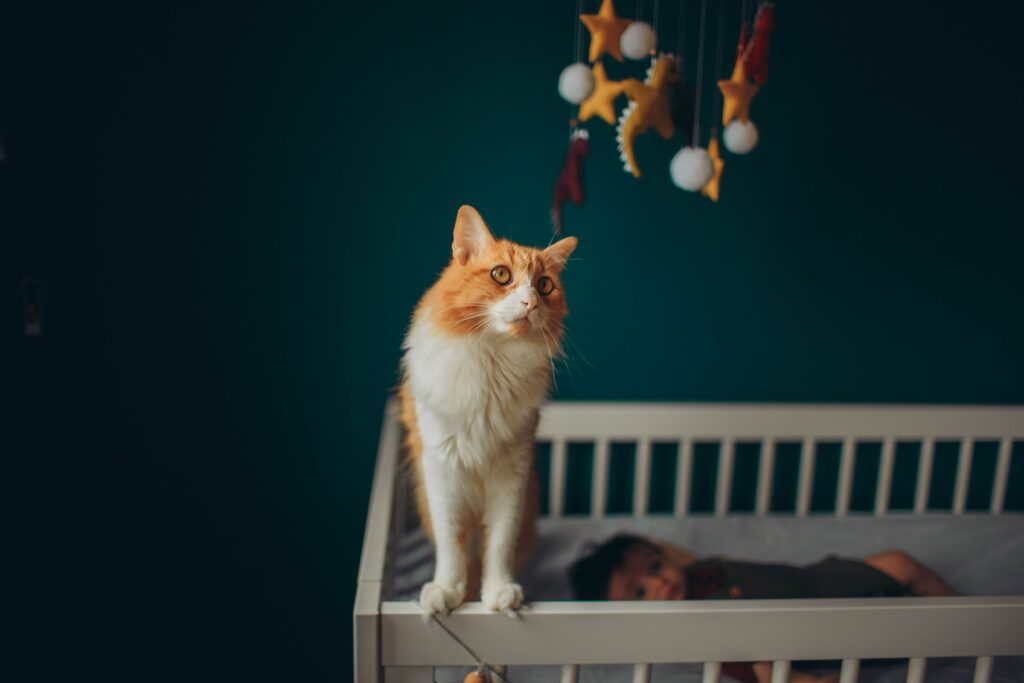As a former Veterinary Technician, a Doula, and a beloved pet owner, Stephanie E. finds that clients often worry about how their furry members will feel about a new baby. This is a valid concern. Here are her top tips to prepare and introduce your pet to the new baby:

First off, does your pet know that you are pregnant?
I feel that dogs and cats are in tune with the emotional and behavioural changes of their owners. It is inconclusive if they know definitively that you are growing a baby. Either way, your cat or dog can recognize that changes are happening at home. Changes to their routine can be common as your schedule gets busier with care provider appointments and other pregnancy priorities. They will be curious as more baby items start appearing in your home. For some animals, change can be scary.
While your pregnant
If our cats and dogs have not had many opportunities to spend time with babies, your pets may think this new family member is a strange and scary creature that smells funny.
It is a great idea to help your dog or cat get used to baby sounds and movements so that aspects of baby life are familiar to them before your baby is born. Turning on electronic devices, like the baby’s swing, for a few minutes every day. Playing a recording of baby sounds can also be helpful. This YouTube video is a great example. If your animal has not had any exposure to an infant you may want to get a doll and hold it at times, as well as have it in areas of the house where the baby will be such as the bassinet and change table.
Plan and Practice Changes to Your Daily Routine
If your cat or dog is used to being fed exactly at 7:30 AM and 5:30 PM every day, begin adjusting feeding times so that being fed later won’t be stressful. Vary your walk times and duration as well. Try not to overdose your pet with extra love and attention before the new baby arrives because this can be a detriment to them. If your fur baby goes from daily over-the-top attention to a lot less after the baby arrives this can cause anxiety and unwanted behaviours.

Cats
It is often presumed that cats will smother a newborn because they are attracted to the scent of milk. Although they may try to jump in the crib or snuggle in the bassinet this is only a rumor. A cat would never intentionally have a motive to harm your baby. Your cat is merely looking for warmth and comfort. The crib, the bassinet, and the car seat are all new items in your home that make your cat curious. This is a normal response from an animal. Use sticky tape on baby items that you don’t want your cat to play with or snuggle in. They hate sticky tape!
Also, try to change caregiver roles. Vary which adult feeds the cat.
Dogs
Just as cats get a bad rap, we tend to give our dogs too much credit when it comes to children. Don’t expect that your dog will see the baby as “part of the pack” and instinctually accept them. Your baby’s behaviour can cause some dogs to feel fearful and afraid. Even the best-behaved dogs can snap if they are afraid. Introductions between your baby and your pets should be gradual and all connections should be supervised.
Consider hiring a dog walker to take over the responsibility of exercising your dog, at least for the first few weeks after the baby arrives. Interview dog walkers and choose one now. To help your dog get used to leaving your house without you, you can have the dog walker start taking them on occasional walks.
The Baby is Here!
It can be beneficial if someone (such as your partner, relative or friend) can bring a blanket home from the hospital that your baby has been using. This will help your pet become familiar with the baby’s scent before you get discharged. Cats have approximately 200 million smell receptors; dogs have 400 million, so getting used to the smell of the newest family member before they meet them can make this transition easier.
Your dog needs to be calm before meeting your baby. Have a family member or friend take your dog for a long walk, a game of fetch, or anything else that will get them tired enough to be in a calm state.
Your dog will be very curious about their new family member, so it makes sense that they will try to get close to investigate the baby. Watch for and praise appropriate behaviours like backing off when you ask your dog to and sitting politely instead of jumping up to see the baby.
I don’t usually recommend leashing your dog around the baby, however, YOU know your dog best! It depends on how they are on a leash. Some dogs are more reactive if held back, which is not the goal here. Many articles and websites do recommend this step, though I feel it’s OWNER PREFERENCE. If they listen to commands even better when leashed, then perhaps use it.
I also recommend giving your dog lots of attention when the baby is present. Teach the dog that when the baby is around, the dog will get treats, petting and playing — and anything else the dog likes. When feeding the baby, you feed the dog too. When you walk the dog take your baby along.
If the Baby’s Room Will Be Off-Limits
Some families prefer that their dog wait outside the baby’s room unless invited in. The easiest way to accomplish this is to teach your dog to sit-stay or down-stay by the door.
When you are not training, keep the baby’s door closed or install a tall baby gate in the doorway so that your dog gets used to restricted access.
If the Baby’s Room Won’t Be Off-Limits
Put a dog bed in an out-of-the-way spot in the baby’s room, and keep a container of dog treats in the room. Every once in a while, leave a few treats on your dog’s bed when they are not looking. Later on, they can discover them on their own. They will learn to love their new spot in the baby’s room!
You can train your dog to settle on their new bed by getting them to relax on the bed while you sit in a chair. Try giving them a new chew bone or a food puzzle toy to work on during your quiet time sessions.
Jealousy
Our pets can get their noses out of joint, especially with change so please remember they typically act like this because they had you to themselves for quite some time before the baby’s arrival.
Signs of jealousy in cats range from excessive meowing to destructive behaviour, including urine marking. Do your best to maintain some of your cat’s normal routine after your baby comes home.
To minimize or avoid upset cats there are a few helpful suggestions for your kitty. Have stress-relieving toys, such as a scratching post. Try to have safe places where your cat can retreat to alone. Do your best not to neglect your cat’s basic hygiene needs or playtime – it is okay if this goes from daily to every other day.
Always reward your cat and dog for good behaviour. They need to know they are doing a great job behaving so well.
Always remember that although we may never think our dog or cat would do any harm to your children, please do not leave your pets alone with them. They are still an animal although a VERY IMPORTANT FAMILY MEMBER AS WELL. This is especially important once your baby is on the move and starting to get curious with their furry siblings.
